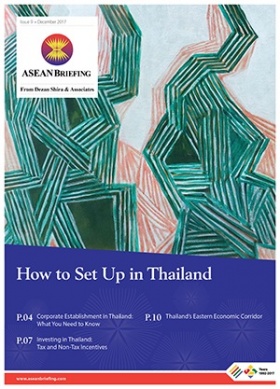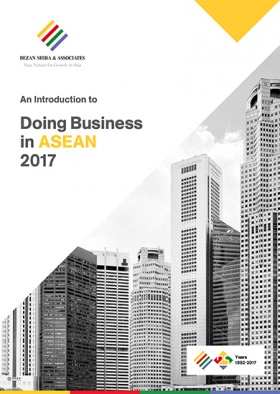Managing Trade Secrets in Thailand
By: South-East Asia IPR SME Helpdesk
Trade secrets are a highly valuable form of intellectual property that nearly all businesses in all industries and sectors possess. However, they are frequently overlooked by businesses, partly because there is confusion about what actually constitutes a trade secret. So what is a trade secret?
According to the World Intellectual Property Organization (WIPO), any confidential business information that is of considerable commercial value to businesses and that provides an enterprise with a competitive edge may be considered a trade secret. In practice, this could be:
- sales methods
- distribution methods
- consumer profiles
- advertising plans
- pricing strategies
- lists of suppliers and clients
- manufacturing processes
In other words, more often than not trade secrets are the ‘know-how’ that a business builds up over time. Typically, the longer the SME is in business the more valuable its trade secrets will become, and the more its business grows the more its competitors will seek to discover this valuable working knowledge. Therefore, it is increasingly important to take steps to protect trade secrets.
Unlike some other forms of IP rights, such as patents and copyrights that have a finite term, trade secrets can theoretically enjoy an infinite term of protection, so long as the trade secret remains just that – a secret. Furthermore, to be enforceable by law in South East Asia it is generally required that as well as not being known to the public and providing economic benefits to the holder, the secret should be subjected to reasonable efforts to protect it and there should be evidence of these efforts.Trade secrets are not always in tangible form, they may be stored in printed documents, CDs or DVDs, computer files and hard drives, USB drives, or even in your head. As it is not always practical or possible to keep trade secrets locked away, keeping them safe usually involves using a combination of physical, technical, and contractual barriers. Although some businesses go to great lengths to protect their trade secrets, any business can and should take simple, sensible precautions, keeping in mind the three forms of barrier that can be used in South East Asia:
- Physical barriers may include simply marking documents ‘CONFIDENTIAL’, keeping sensitive documents in a safe, undisclosed location, and locking files away after business hours. In addition, access to areas where sensitive business documents are stored should be restricted to certain employees. SMEs should limit access and copying rights to the person who actually need it. All visitors should be logged, required to sign a non-disclosure agreement before being granted access to sensitive areas of the company’s premises, and should not be left unattended.
- Technical barriers address the use of information technology (IT). Consulting an IT security specialist can help companies to design a cost-effective IT security system. However, even simple, inexpensive means of IT security measures can be used such as employing the proper use of passwords, commercially available encryption, and logging features. In addition, it is important to have a written technology policy in place and to ensure that your employees abide by it. For example, as it is extremely easy for employees to email sensitive documents to third parties or to transfer files using USB drives or CD/DVDs, SMEs might want to consider restricting the ability of their employees to use USB drives and burn CD/DVDs. Employees should be given a copy of the company’s technology policy written in both English and the local language (possibly as an appendix to their employment contract) and be required to sign an agreement stating they received and understand the policy.
- Contractual barriers generally involve the use of non-disclosure or confidentiality agreements. In fact, such agreements are generally considered as one of the best ways to protect trade secrets. SMEs should require every existing employee and all new employees to sign an employment contract with non-disclosure or confidentiality provisions. This should be in both English and the local language to prevent an employee from claiming that he or she did not understand the confidentiality obligations. Such agreements should also be entered into with suppliers, subcontractors, and business partners who are given any level of access to company’s trade secrets.
Trade secrets are protected by laws in many southeast Asian countries like Indonesia, Thailand, Singapore, and Malaysia for example. All of these countries have specific requirements for trade secret protection by law, which normally include that:
- The information is confidential (i.e. non-public)
- It has real or potential economic value
- Necessary measures have been taken to protect its secrecy.
In Thailand, trade secrets should be recorded with the Thai Department of Intellectual Property (DIP) in order to be fully enforceable. Only basic information is required for this, and efficient recording strategies can be set up without actually disclosing essential contents of the trade secret.
SMEs should make sure to document the trade secrets protection measures they take. It is also essential to maintain sufficient records of the flow of information in and out of the company, including keeping records of meetings, discussions, emails, written correspondence, and the transfer of electronic files so that a company can conduct an investigation and have evidence in case it suspects that its trade secrets have been misappropriated. In many Southeast Asian countries like Indonesia and Thailand, for example, it is necessary to prove that the secret has been taken by the suspected party. This, however, can be difficult as the litigation procedure in many southeast Asian countries like Indonesia is not equipped with sufficient discovery mechanisms to uncover the relevant evidence.
Companies can assist the courts by having their own security monitoring in place, including CCTV recording and recorded entry/exit data of rooms where physical documents are held, as well as electronic monitoring of file access and copying etc. Companies can also engage local investigators, however, this approach should me made with caution as in some South-East Asian countries like Indonesia, law accords individuals’ strict privacy rights and infringers could complain that their own rights have been infringed, potentially weakening any case against them.
It should be kept in mind that unlike other forms of intellectual property there is usually very little a business can do once a trade secret has been disclosed. Therefore, it is vital that SMEs take preventative measures in advance of making use of their confidential business information in South East Asia.
Trade Secrets in Thailand: What You Need to Know
As mentioned above, European SMEs should consider recording their basic trade secret information with the DIP in Thailand for additional protection. This registration is important because in case of trade secret violation, Thai authorities may request proof of trade secret recording in order to initiate legal proceedings.
In relation to the pharmaceutical sector, Thai law does not yet grant data ‘exclusivity’, which would guarantee additional market protection for originator pharmaceutical companies (i.e. companies that have discovered and developed pharmaceuticals). Health authorities or generic drug applicants in Thailand are not prohibited from referring to originator pharmaceutical companies’ data to approve generic versions of the originator’s product; current measures aim only to protect the “physical disclosure” of confidential information.
Agreements between parties, such as employment agreements or confidentiality agreements, concerning trade secrets are very important in Thailand. It is therefore important for these agreements to be complete and concise.
About South-East Asia IPR SME Helpdesk
The South-East Asia IPR SME Helpdesk supports small and medium sized enterprises (SMEs) from European Union (EU) member states to protect and enforce their Intellectual Property Rights (IPR) in or relating to South-East Asian countries, through the provision of free information and services. The Helpdesk provides jargon-free, first-line, confidential advice on intellectual property and related issues, along with training events, materials and online resources. Individual SMEs and SME intermediaries can submit their IPR queries via email (question@southeastasia-iprhelpdesk.eu) and gain access to a panel of experts, in order to receive free and confidential first-line advice within 3 working days.
The South-East Asia IPR SME Helpdesk is co-funded by the European Union.
To learn more about the South-East Asia IPR SME Helpdesk and any aspect of intellectual property rights in South-East Asia, please visit our online portal at http://www.ipr-hub.eu/.
About Us
ASEAN Briefing is produced by Dezan Shira & Associates. The firm assists foreign investors throughout Asia and maintains offices throughout ASEAN, including in Singapore, Hanoi, Ho Chi Minh City and Jakarta. Please contact us at asia@dezshira.com or visit our website at www.dezshira.com.
- Previous Article CPTPP and Opportunities for Businesses in ASEAN
- Next Article Indonesia’s Investment Outlook for 2018









